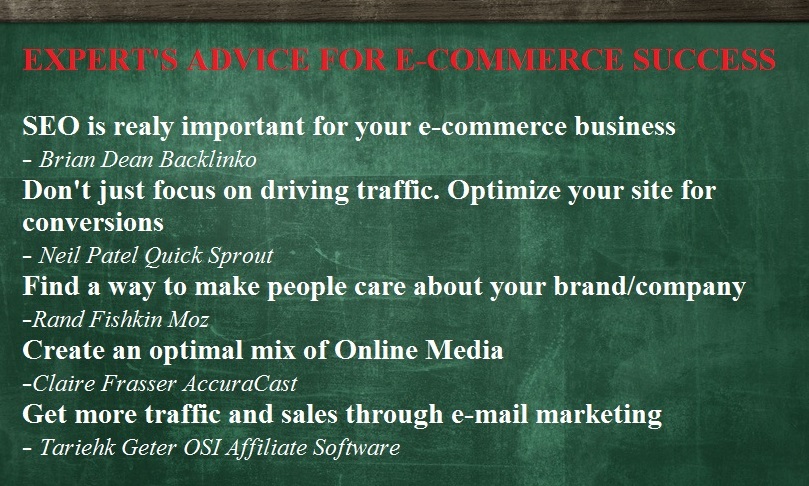It takes hours setting up an e-commerce business but it can take years to build a successful E-Commerce Stores. E-commerce is a trillion dollar industry that’s growing leaps and bounds per year.
But still there’s only a small percentage doing well.
First off, the physical to digital transition has changed the way we do business today but it hasn’t changed the essence of doing business. As an e-commerce startup you can definitely outperform the biggies if you do it right.
Here’s what they do right.
Successful E-Commerce Stores use the technology that does not suck
No seriously, if a website is making me run in circles I’m not going to buy from them.
Besides being easily navigable, every successful e-commerce website gives utmost attention to the technological aspect of running an e-commerce.
From responsive layouts to ensuring hassle-free shopping on every device, they pay top bucks to keep things smooth and running, which is why their cart abandonment rate is also low.
Check out this Nuts.com for its practical imagery, good layout , and to-the-point copy:

Given the advancement in the latest technology and robust high-tech software like Avactis, most new e-commerce websites can be at par with their established counterparts.
They set aside a (big) budge for Marketing and Testing
As a completely or moderately new player in the field, you need to get the word out first.
People should know about the brand and be encouraged to deal with them. Usually this encouragement comes through incentives initially.
 Focus on SEO and marketing to increase traffic. Harness the power of social media marketing or tie up with other known names from the industry (obviously not competitors) to increase visibility.
Focus on SEO and marketing to increase traffic. Harness the power of social media marketing or tie up with other known names from the industry (obviously not competitors) to increase visibility.
Typically, you should spend 80% of your time on marketing following the website launch.
They think long-term
You cannot expect to start minting money from day one. In fact in e-commerce you cannot expect to even reach break-even by the 4th month.
All your ROI (Return on Investment) calculations should be long-term. You can do a quarterly evaluation too but that should be mostly to know how much you’re putting back in the business.
 You have tohave long-termperspectives if you intend your e-commerce store to be counted in the big league. Initially, you’d be spending a lot more money on marketing and whatever recovery you make should be reinvested in the business.
You have tohave long-termperspectives if you intend your e-commerce store to be counted in the big league. Initially, you’d be spending a lot more money on marketing and whatever recovery you make should be reinvested in the business.
They provide something different
Unless you are selling a miraculous overnight weight loss pill, chances are there are other websites retailing the same product.
You need to differentiate your brand and your products from the competition to both get noticed and make sales.
E-Commerce conversion relies heavily on specialization. If whatever you are selling is unique or different, and provides an additional value then the customers are going to flock to your website.
Not selling a unique product? Market it as such. Use the right marketing techniques to show your product in a different light. There are 1000 brands selling jeans but how many of them are selling a pair that can be worn inside out or has a concealed pocket?
Find your Value Proposition when you’re retailing a generic item

They promise to deliver items fast, like yesterday!
Customers expect delivery two seconds after ordering so you need to tie-up with the absolute best in logistics. Sometime superfast delivery could become a USP of its own.
In the business you can only eat with the ones you have started with.Look for companies driven by the same passion and thirst for success because then they become assets and not liabilities.
Also, customers are quick to bring the entire company down if their order gets delayed for long. They take to social media to vent and that can spell disaster for your reputation.
They hire a knowledgeable customer support team
 I hate talking to customer service guys who don’t know their nose from their tooshies. It’s downright irritating!
I hate talking to customer service guys who don’t know their nose from their tooshies. It’s downright irritating!
Hire people who know about the how things work or train them. If a customer calls them up with a query or complaint, they should be able to provide valuable answers.
Plus make sure they take each complaint seriously and work double hard to get it sorted.
They listen to what their customers have to say, especially if it’s bad
Any feedback from your customers today can shape your e-commerce business for the better tomorrow.

Image courtesy Sainsburys
Take each feedback, complaint, abusive Facebook post, death threat (hopefully not) seriously to understand where exactly you are going wrong. And then make implementations to set it right.
Lastly and most importantly they don’t do everything at once. Follow their lead and chalk up a strategy and a step-by-step plan to get a clear idea.


